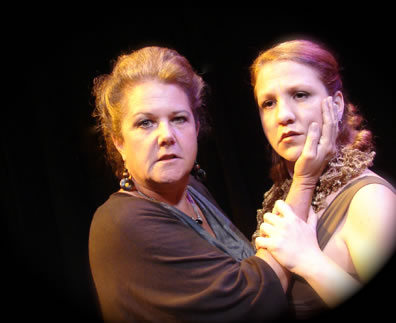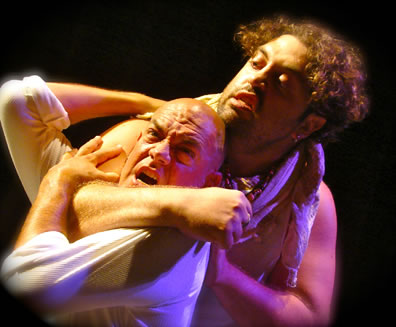Coriolanus
Acting and Character Succeed against
Sci-Fi Telling and Rain-Soaked Conditions
The Palm Beach Shakespeare Festival, Carlin Park's Seabreeze Amphitheater, Jupiter, Fla.
Friday, July 12, 2013, center lawn
Directed by Kevin Crawford

Karen Chandler, left, as Volumnia and Krys Parker as Virgilia in the Palm Beach Shakespeare Festival's production of Coriolanus. Below, Aufidius (Zach Myers) has Caius Martius Coriolanus (Kevin Crawford) in a headlock. Photos courtesy of Palm Beach Shakespeare Festival.
One, it's Coriolanus, a play that can seem convoluted even in the best of hands. Two, it is set in a Mad Max cum Spacy Odyssey setting. Three—infuriating for Shakespeare purists—the production cuts huge chunks of text while importing chunks of text from another play. Four and foremost, it rained. The Palm Beach Shakespeare Festival performs its Shakespeare By the Sea XXIII production at Carlin Park's outdoor Seabreeze Amphitheater in Jupiter, Fla., and on the night we attended, a steady rain fell from the preshow magician (the wet conditions foiling his card trick) to the curtain call. (the cast gave the audience a roaring ovation for staying with them).
Despite all of these factors, a moment late in the play makes any and all contrary circumstances worth bearing: Experiencing a Volumnia in a performance that will mingle tears with the raindrops on your cheeks.
Director Kevin Crawford, who also plays Caius Martius Coriolanus, has given his version of the play a sci-fi bent. In fact, it's not really Coriolanus: The program calls it "Universe Deep Space Directive Project: William Shakespeare's Coriolanus." The official setting is "A place calling itself 'Rome,' Kepler Object of Interest KOI-172.02." The official "Space Date" is "That is to be or come hereafter." At center stage stands a stone monolith straight out of 2001: A Space Odyssey that, in the glow of ever-changing colored lights, serves as an altar of worship for the characters.
All are in some form of modern dress: monotone dresses for mother and wife, jeans, T-shirts, and battle fatigues for the rest. However, the two tribunes (Jim Brogan as Brutus, Wally Lurz as Sicinius) wear what appears to be black tribal war paint on their faces. The production gives no obvious explanation of why these representatives of the Roman people should look like aliens.
The rabble comprises four women who crawl to the stage through the audience like chimps toward the monolith, where they attack and apparently eat another woman who comes upon them. The people of this place calling itself Rome are famished, indeed, and it underscores Caius Martius' contention that if not for the senate keeping them in awe they "would feed on one another." He complains of the people that "Who deserves greatness deserves your hate," and "every minute you do change a mind, and call him noble that was now your hate, him vile that was your garland," as if this mentality is what's really behind their cannibalism.
This Caius Martius Coriolanus may suffer a disconnect with the common people, but we don't get a sense of why he should be at such odds with them, and vice versa. Crawford is expert at delivering the verse, and his "I banish you" speech is electrifying; even the rain paused briefly at this moment, seeming to yield to a presence that expanded out from Crawford's self through this impassioned oration. But rather than displaying a class-fueled distaste for the plebians or an arrogance, borne of a mother's doting, for any person who doesn't meet his high standard of honor, this Caius Martius behaves like a Marine Corps drill instructor with a lot on his mind. Crawford's Coriolanus seems to suffer chronic depression from being weighed down by the burdens of life and command—basically, Hamlet with all the humor and human regard drained from him.
The most telling scene in this production of Coriolanus is when, on the eve of departing for battle against Aufidius and the Volscians at Corioli, Caius Martius appears on stage deep in thought, soon joined by Virgilia (Krys Parker) demanding to know "Why dost thou bend thine eyes upon the earth, and start so often when thou sit'st alone? Why hast thou lost the fresh blood in thy cheeks and given my treasures and my rights of thee to thick-eyed musing and curst melancholy?" Clearly, Virgilia has nailed a description that fits Crawford's Coriolanus to a tee, but this speech is actually Lady Percy speaking to Hotspur in Henry IV, Part One. With this stunt, Crawford seems intent on establishing two things: one, making Coriolanus noble but misguided instead of an arrogant but courageous jerk; two, giving Virgilia a substance that Shakespeare generally doesn't give her—as he may have purposely portrayed Virgilia to be a woman of little presence in Coriolanus' conscious, for the playwright provides two scenes specifically illustrating how unlike Caius she is.
Starting with this interpolated scene and its Lady Percy DNA, Parker plays Virgilia as passive aggressive, subtly standing up to her mother-in-law and manipulating her husband. When Coriolanus is counseled by his mother and Menenius to temper his reaction to the people as he stands for consul, Virgilia speaks the line "Repent what you have spoke" that Shakespeare gives to Menenius. That Volumnia (Karen Chandler) does not like her daughter-in-law is obvious, and not just in the way the two interact; when Coriolanus enters Rome in triumph after the battle of Corioli, Chandler speaks the line "But O, thy wife!" as if Virgilia is simply the last item on Coriolanus' checklist, almost forgotten. Near the end of the play, as the women come home in triumph after having successfully forestalled Coriolanus from attacking Rome, Virgilia bears a haughty countenance—she behaves in a more arrogant fashion toward the people than have Crawford's Coriolanus and Chandler's Volumnia combined. Meanwhile, Volumnia is crushed. She knows what Virgilia fails to comprehend, that Coriolanus has become "most mortal" because he has been manipulated by the women.
The more I see this play, the more I regard Volumnia as one of Shakespeare's great creations, and Chandler plays her arc with such a nuanced reading that she attains great empathy for the character. We don't clearly see Crawford's Martius acting as a mama's boy, but we do see Chandler's Volumnia doting on her only son and attempting to steer him. She can steer him to become a great warrior and attain great honors, but she can't control his great temper, which ultimately is his undoing. She then becomes just another victim of his temper, starting with his banishment from her. In his parting scene she can't summon the will to admonish him or even advise him; she can only weep. Afterward, she vents her anguish fully on the tribunes but concludes by saying to Menenius, "Anger's my meat, I sup upon myself, and so shall starve with feeding," more in despair than anger.
When we get to the supplication scene, Chandler gives us a woman lacking hope but still proud. Volumnia sacrifices every ounce of her pride and expends every iota of control to move Coriolanus to a peace. She chooses Rome's security over her son's nature, and in doing so erases everything she raised him to be and sends him toward his destruction. Point by point, prod by prod, she strips herself bare down to raw emotion. Met only with Coriolanus' silence, she cries from her shattered heart, "Speak to me, son." Yet, she keeps on, resorting to accusing her son of having "a Volscian to his mother." That pierces Crawford's Coriolanus, but yet he still will not look on her, not until she has nothing left—not even her own self—and gives up. "Yet give us our dispatch," she says. "I am hushed until our city be afire, and then I'll speak a little." Only this—a mother without even a voice—finally breaks this Coriolanus, and Crawford plays his own emotional swelling to devastating effect. This moment is so powerful, even if the rain were pouring in Noah proportions I'd stick around to experience Chandler's and Crawford's performances.
Another gut-punching moment comes when Cominius (Pierre Tannous, combining the commanding general's part with that of Lartius, Coriolanus' second-in-command), upon hearing of the Coriolanus-led Volscian march on Rome, strolls across the stage, cynically clapping his hands. "O, you have made good work" he says. The line in the text is seemingly aimed at the tribunes, but Tannous addresses the speech to us: "You have holp to ravish your own daughters and to melt the city leads upon your pates, to see your wives dishonored to your noses."
 Aufidius is a bully of a man in the portrayal of Zach Myers. At times he seems more like Shakespeare's Coriolanus than does Crawford, and we see him chafing as Coriolanus' stature grows in leading Aufidius' Volscian army. Their fights are mimed, without weapons, but with sound effects. Effective, nevertheless: In the climactic assassination, Aufidius stabs Coriolanus in the back, then turns him around and guts him like a butcher slaughtering a lamb, and Myers mimes it so effectively people in the audience gasp. Aufidius kills him with a kiss, too. Coriolanus shows respect for his warrior foe, but Aufidius demonstrates true admiration in return, and when he calls Caius "traitor," it erupts from a broken heart.
Aufidius is a bully of a man in the portrayal of Zach Myers. At times he seems more like Shakespeare's Coriolanus than does Crawford, and we see him chafing as Coriolanus' stature grows in leading Aufidius' Volscian army. Their fights are mimed, without weapons, but with sound effects. Effective, nevertheless: In the climactic assassination, Aufidius stabs Coriolanus in the back, then turns him around and guts him like a butcher slaughtering a lamb, and Myers mimes it so effectively people in the audience gasp. Aufidius kills him with a kiss, too. Coriolanus shows respect for his warrior foe, but Aufidius demonstrates true admiration in return, and when he calls Caius "traitor," it erupts from a broken heart.
Trent Stephens plays Menenius as something of a dandy in Italian suits, a fine performance that is unfortunately abbreviated, as so much of his part is cut. However, this production steals the scene from Ralph Fiennes's film version of the play in which Menenius takes his own life at the end: It's a superfluous inclusion in the film (the movie's only demerit, in my opinion), and it is superfluous in this production, too.
Even with the insertion of Menenius' suicide near the end, the Hotspurs early on, and, at the start, the cannibals' long approach to the monolith and their dinner, the play's running time still comes in at just two hours, indicating how much of the text is cut. Yes, the Menenius parable of the belly gets long-winded and might merit lopping (but, then, that passage is so Menenius), but condensing the centerpiece political scenes loses the effectiveness with which Shakespeare so expertly portrays the fickle nature of republican governance.
But this Coriolanus is less a political-vice-personal drama and more a traditional tragedy in which the hero's primary flaw seems to be that nobody gets him—not his wife, not his friends, not his enemies, not the people, and not even his own mother. Ultimately, though, the tragedy is not his alone, and this production should have been called Volumnia.
Eric Minton
July 18, 2013
Comment: e-mail editorial@shakespeareances.com
Start a discussion in the Bardroom



 Find additional Shakespeareances
Find additional Shakespeareances